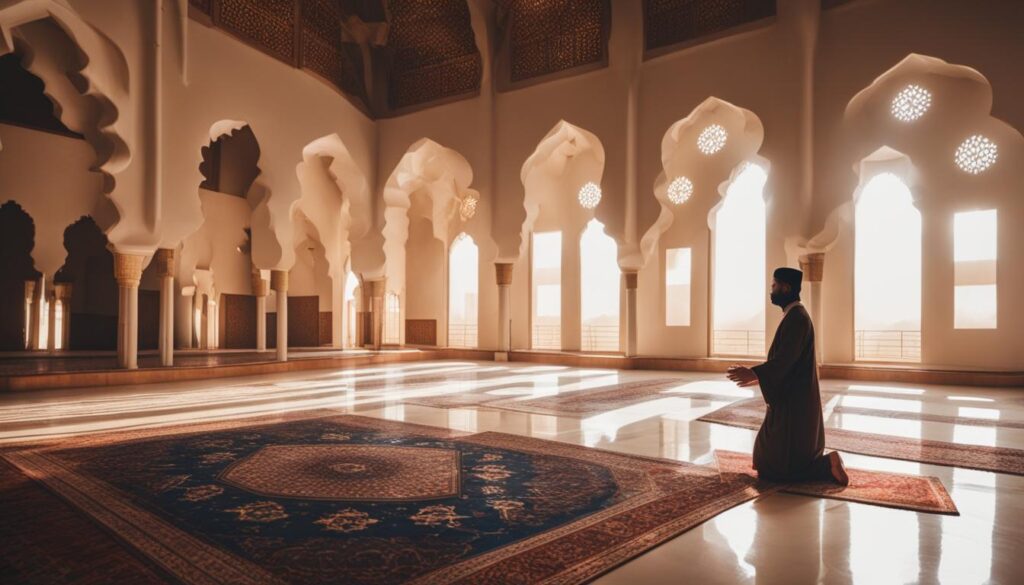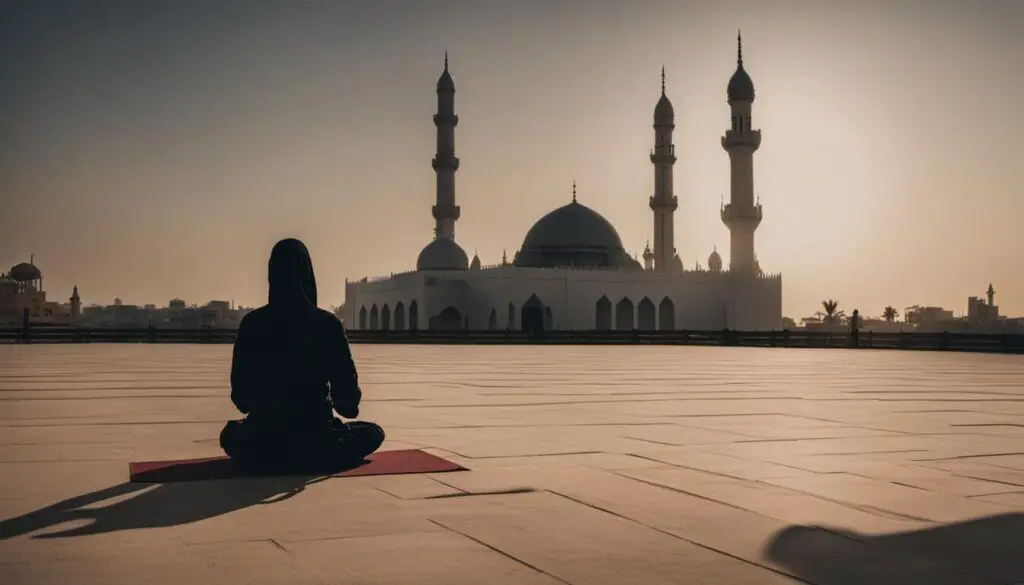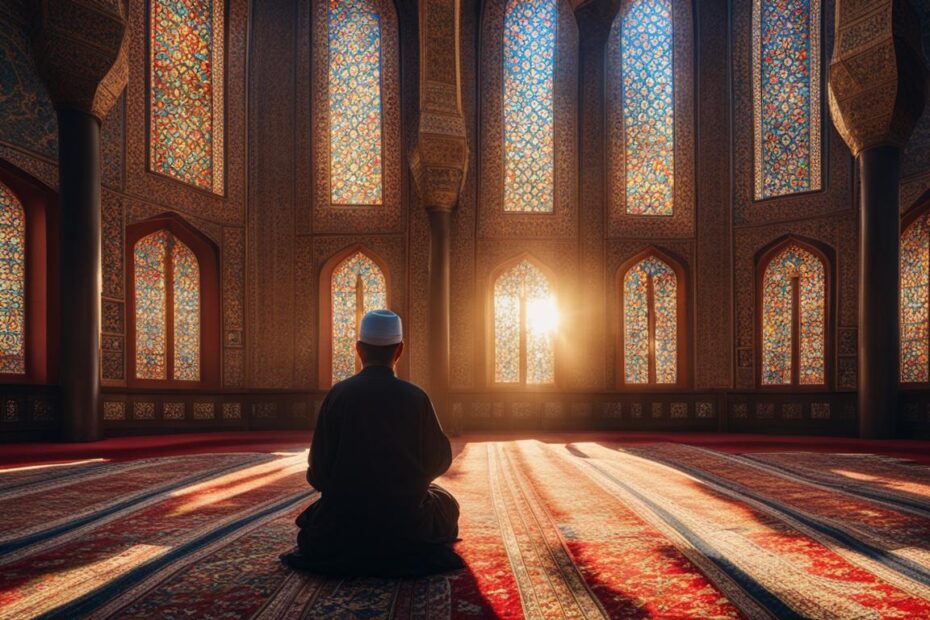Prayer practices in Islam are a fundamental aspect of the religion. Muslims engage in specific rituals, timings, and techniques to perform their prayers, also known as salah. These practices involve various steps such as ensuring cleanliness, performing wudu (ablution), facing the Qibla, and praying at the proper times. The significance of prayer in Islam is emphasized in the Quran, and it is considered one of the pillars of the faith.
Key Takeaways:
- Prayer practices in Islam are essential for Muslims.
- These practices include rituals, timings, and techniques.
- Cleanliness, facing the Qibla, and praying at the proper times are crucial aspects of prayer.
- Prayer is considered one of the pillars of Islam and is emphasized in the Quran.
- Exploring prayer practices in Islam can deepen one’s understanding of the faith.
The Importance of Cleanliness in Prayer
Before engaging in prayer, Muslims must ensure that they are clean both physically and spiritually. This involves performing wudu, a ritual ablution, to cleanse the body. Wudu includes washing the face, hands, arms, hair, and feet. In certain circumstances, such as after sexual intercourse or menstruation, Muslims must perform ghusl, a full shower, to purify themselves. If water is not available, tayammum, a dry purification using clean soil or dirt, can be performed as an alternative. These cleansing practices help create a state of ritual purity necessary for prayer.
The act of performing wudu itself holds great significance for Muslims. It serves as a physical and spiritual preparation, symbolizing the removal of impurities and the intention to engage in prayer. During wudu, Muslims are encouraged to recite supplications and invoke blessings, further enhancing the spiritual aspect of the cleansing process.
Cleanliness in prayer extends beyond the physical realm. Muslims are also encouraged to purify their hearts and minds, seeking forgiveness for any wrongdoings and striving for a state of inner purity. This emphasis on cleanliness underscores the importance of approaching prayer with reverence, humility, and a sincere intention to connect with Allah.

Facing the Qibla and Prayer Timing
During prayer, Muslims must face the Qibla, which is the direction of the Holy Ka’bah in Mecca. The Qibla serves as a focal point of unity for Muslims worldwide. It is essential to determine the Qibla’s direction and face it while offering prayers. Additionally, prayer timings are significant in Islam. The five daily prayers, known as Fajr, Zuhr, Asr, Maghrib, and Isha, have specific time windows in which they should be performed. Muslims strive to pray within these designated periods to fulfill their religious obligations.
Observing the Qibla and adhering to prayer timings help create a collective sense of connection and synchronization among Muslims across different geographical locations. It symbolizes the unity and uniformity of the Islamic community, with all believers facing towards the same sacred destination and engaging in worship at the same prescribed times. This consistent orientation and adherence to prayer timing fosters a shared spiritual experience that transcends cultural, linguistic, and national boundaries.
To determine the direction of the Qibla, Muslims can use tools such as compasses or rely on mosque structures that are built to align with the Qibla. In today’s digital age, smartphone applications and online resources also provide accurate Qibla direction indicators based on the user’s location. Muslims are encouraged to double-check the accuracy of these tools and ensure they are facing the correct direction before initiating their prayers.

Table: Prayer Timings in Islam
| Prayer | Time |
|---|---|
| Fajr | Before sunrise |
| Zuhr | After the sun passes its zenith until mid-afternoon |
| Asr | In the afternoon before sunset |
| Maghrib | Immediately after sunset |
| Isha | After twilight until midnight |
Adhering to prayer timings not only fulfills the religious obligations of Muslims but also provides a structured routine throughout the day. It serves as a reminder to pause from daily activities, reflect, and reconnect with the spiritual realm. By prioritizing prayer and aligning their daily schedules accordingly, Muslims strive to strike a balance between their worldly commitments and their devotion to Allah.
Steps of Performing Salah
Performing salah (Islamic prayer) involves a set of specific steps, known as rak’ahs. Each obligatory prayer in Islam has a defined number of rak’ahs, ranging from 2 to 4. Additionally, Muslims have the option to perform additional voluntary prayers before or after the obligatory prayers. These voluntary prayers offer an opportunity for increased worship and spiritual connection with Allah.
The specific steps of salah can vary depending on the type of prayer and the number of rak’ahs being performed. However, there are some common elements that are present in most prayers:
- Standing (qiyam): The prayer begins by standing and facing the Qibla, the direction of the Holy Ka’bah in Mecca.
- Intention (niyyah): Muslims make a silent intention in their hearts to perform the specific prayer.
- Takbiratul Ihram: The prayer is initiated by raising the hands and saying “Allahu Akbar” (Allah is the greatest).
- Recitation of Surah Al-Fatihah: Muslims recite the opening chapter of the Quran, Surah Al-Fatihah, silently or audibly.
- Bowing (ruk’uh): Muslims bow with their hands on their knees, saying “SubhanAllah” (Glory be to Allah) three times.
- Prostration (sujood): Muslims place their forehead, nose, hands, knees, and toes on the ground while saying “SubhanAllah” (Glory be to Allah) three times.
- Sitting (jalsa): Muslims sit briefly between the two prostrations.
- Second prostration: Muslims repeat the prostration position.
- Tashahhud: Muslims recite the Tashahhud, a supplication and declaration of faith.
- Salutations (tasleem): The prayer is concluded by turning the head to the right and saying “Assalamu alaikum wa rahmatullah” (Peace and blessings of Allah be upon you) and then to the left to repeat the same greeting.
These steps may vary slightly between different prayers, such as the additional standing and recitation of the Quran in the first two rak’ahs of the Fajr prayer. It is important for Muslims to learn and practice the correct steps of salah to fulfill their religious obligations.
The Significance of Salah in Mental Health
Engaging in regular prayer can have profound effects on an individual’s mental health and well-being. Salah, the Islamic practice of prayer, provides a unique opportunity for Muslims to find solace, reduce stress, and cultivate emotional well-being. By immersing oneself in prayer, individuals can experience a sense of peace, tranquility, and connectedness to a higher power.
Prayer serves as a form of meditation and reflection, allowing individuals to quiet their minds and focus on their spiritual connection with Allah. This act of mindfulness can help reduce stress and anxiety, allowing individuals to find a sense of calm amidst life’s challenges. The repetitive nature of salah and the recitation of sacred verses can have a soothing effect on the mind, providing a break from the fast-paced and demanding nature of everyday life.
Additionally, engaging in salah offers a sense of purpose and meaning. Through prayer, individuals can seek guidance, express gratitude, and seek forgiveness. This process allows for introspection and self-reflection, fostering personal growth and emotional healing. Salah provides a sacred space for individuals to reconnect with their values, beliefs, and spirituality, promoting a sense of emotional well-being and fulfillment.

Benefits of Salah on Mental Health
| Benefits | Description |
|---|---|
| Stress Reduction | Engaging in salah can help reduce stress and promote a sense of calm and relaxation. |
| Emotional Well-being | Regular prayer can contribute to emotional well-being by allowing individuals to express their feelings and find solace in their faith. |
| Mindfulness | Through mindful prayer, individuals can cultivate a heightened sense of self-awareness and live in the present moment. |
| Connectedness | Prayer provides an opportunity for individuals to connect with a higher power and foster a sense of spiritual connectedness. |
Combining Yoga and Salah for Holistic Mental Health
As individuals seek holistic approaches to mental health, the integration of yoga and salah (prayer) has gained attention for its potential benefits. Yoga, a practice that combines physical postures, breathing exercises, and meditation, can be seamlessly incorporated into the performance of salah. By blending elements of deep breathing, mindfulness, and physical movement, individuals can enhance their mental well-being while also deepening their spiritual connection.
“The integration of yoga and salah offers a unique opportunity to cultivate a comprehensive approach to mental health,” says Dr. Aisha Patel, a mental health expert. “Yoga encourages mindfulness and self-reflection, while salah provides a spiritual dimension and a sense of connection with a higher power. This combination can foster a state of inner peace and tranquility.”
The intertwining of yoga and salah is particularly beneficial for stress reduction. Yoga’s emphasis on deep breathing and physical postures can help release tension and promote relaxation. When combined with the rhythmic movements and spiritual focus of salah, individuals can experience a more profound sense of calmness and mental clarity.
By incorporating yoga into salah, individuals can further enhance their physical and mental well-being. The deliberate movements and mindfulness of yoga can deepen the experience of prayer and foster a greater connection with oneself and with Allah. This integrative approach to mental health allows individuals to nurture their entire being—body, mind, and soul.

The Benefits of Combining Yoga and Salah:
- Promotes stress reduction and relaxation
- Enhances self-awareness and mindfulness
- Fosters a deeper spiritual connection
- Nurtures physical and mental well-being
| Yoga | Salah |
|---|---|
| Physical postures | Spiritual connection |
| Deep breathing exercises | Mindfulness and focus |
| Meditation and relaxation | Seeking guidance and solace |
By combining the physical and mental aspects of yoga with the spiritual rituals of salah, individuals can embark on a transformative journey towards holistic mental health. This integrated approach provides a unique opportunity to cultivate balance, inner peace, and overall well-being.
The Role of Salah in Seeking Spiritual Connection
Salah, the ritual prayer in Islam, serves as a means for Muslims to seek a profound spiritual connection with Allah. It is a sacred practice that allows individuals to communicate directly with their Creator, expressing gratitude, seeking forgiveness, and asking for divine guidance. Through salah, Muslims aim to establish a closeness to Allah and deepen their understanding of their purpose in life.
Prayer is a powerful tool for seeking spiritual connection. It provides a dedicated space for reflection, introspection, and mindfulness. By engaging in salah, Muslims set aside worldly distractions and turn their attention inward, focusing on their relationship with Allah. This act of devotion helps individuals to find solace and tranquility in their faith, fostering a sense of peace and serenity in their hearts.
Seeking divine guidance is an essential aspect of salah. Muslims believe that prayer is an opportunity to seek Allah’s blessings and assistance in various aspects of life. Whether facing challenges, making important decisions, or seeking clarity, salah offers a platform to turn to Allah and ask for divine intervention. Through this act of surrender and humility, individuals deepen their reliance on Allah and strengthen their trust in His wisdom.
Salah is not merely a physical act of worship; it is a spiritual journey that allows Muslims to establish a direct connection with Allah. Through prayer, we express our love, gratitude, and dependence on our Creator. Salah serves as a reminder of the importance of nurturing our spiritual well-being and seeking guidance from the divine. It is a deeply personal and transformative practice that brings us closer to Allah and helps us find peace and purpose in our lives.
The Role of Salah in Seek Spiritual Connection
| Benefits of Salah | How Salah Facilitates Spiritual Connection |
|---|---|
| 1. Establishes a regular spiritual routine | 1. Creates a dedicated time and space for connecting with Allah |
| 2. Fosters a sense of humility and surrender | 2. Encourages individuals to acknowledge their dependence on Allah |
| 3. Provides an opportunity for reflection and introspection | 3. Allows individuals to delve deep into their inner thoughts and emotions |
| 4. Strengthens the connection between mind, body, and soul | 4. Integrates physical, mental, and spiritual aspects of worship |
| 5. Nurtures a sense of gratitude and mindfulness | 5. Encourages individuals to express gratitude and be present in the moment |
Salah plays a vital role in nurturing spiritual connection and growth in the lives of Muslims. By engaging in regular prayer, individuals can strengthen their relationship with Allah, find solace in times of difficulty, and experience a sense of closeness to the divine. In seeking spiritual connection through salah, Muslims embark on a transformative journey of faith, seeking guidance, and finding inner peace.

The Psychological Effects of Salah
Engaging in salah, the Islamic practice of prayer, can have profound psychological effects on individuals. The act of prayer offers a moment of pause and reflection in the midst of daily life, allowing individuals to disconnect from worldly distractions and focus on their spiritual well-being. This act of mindfulness can help reduce stress, increase self-awareness, and promote a sense of calm and inner peace.
The repetitive nature of salah, combined with the recitation of sacred verses, can have a soothing and grounding effect on the mind. The rhythmic movements and words create a meditative state, allowing individuals to enter a state of deep concentration and connection with the divine. This focused attention on prayer can help alleviate anxiety, improve mental clarity, and bring a sense of tranquility to the practitioner.
Additionally, salah provides a structured and meaningful routine that can contribute to overall mental well-being. The regularity and predictability of performing salah throughout the day can help individuals establish a sense of stability and purpose. It serves as a reminder of one’s faith and the importance of spiritual nourishment, providing a source of comfort and guidance in navigating the challenges of life.
The Benefits of Mindfulness in Salah
One aspect of salah that contributes to its psychological effects is the practice of mindfulness. Mindfulness involves being fully present in the moment and non-judgmentally aware of one’s thoughts, feelings, and sensations. By engaging in salah with a mindful mindset, individuals can cultivate a greater sense of self-awareness and enhance their ability to regulate their emotions.
“In salah, we are encouraged to be fully present, focused, and aware of each movement and recitation. This practice of mindfulness can translate beyond the prayer mat and into our daily lives, helping us cultivate a greater sense of peace and clarity,” says Dr. Aisha Khan, a psychologist specializing in Islamic psychology.
By integrating mindfulness into salah, individuals can harness the psychological benefits of both practices. This combination can lead to improved stress management, increased emotional well-being, and a greater sense of overall mental resilience.
Duas and Prayers After Completing Salah
After completing salah, Muslims have the opportunity to engage in dua, which is the act of supplicating to Allah. Dua plays a significant role in Islamic prayer practices, allowing individuals to express their deepest desires, seek blessings and protection, express gratitude, and seek forgiveness. These post-prayer duas hold great importance in the spiritual lives of Muslims, as they provide a means of continuing the connection with Allah beyond the physical act of salah.
When engaging in dua after salah, Muslims often use specific supplications that have been taught by the Prophet Muhammad (peace be upon him). These supplications cover a wide range of topics, including seeking guidance, protection from harm, good health, forgiveness, and blessings for oneself, family, and the entire Muslim ummah. By engaging in these duas, Muslims aim to strengthen their relationship with Allah and seek His blessings and assistance in all aspects of life.
One of the commonly recited duas after salah is the supplication for protection and seeking blessings, known as the “Qunut.” This dua is often recited in the last rak’ah of Witr prayer, but can also be recited after the obligatory prayers. Muslims also engage in personal duas, expressing their individual needs and desires to Allah. These post-salah supplications provide a space for personal reflection, connection, and seeking solace in the presence of the divine.
Example of a Dua After Salah:
“O Allah! I seek refuge in You from hardships, distress, and the domination of others. I seek refuge in You from laziness, old age, and the torment of the grave. I seek refuge in You from the distractions of worldly affairs and the punishment of the Hellfire. O Allah! Grant us good health, sincerity in our actions, and the ability to worship You as You deserve. Accept our prayers, forgive our sins, and guide us to the straight path.”
Table: Common Post-Prayer Duas
| Dua | Translation |
|---|---|
| Dua for Forgiveness | “O Allah! Forgive me, have mercy on me, and guide me to righteousness.” |
| Dua for Good Health | “O Allah! Grant me good health in my body and protect me from illnesses.” |
| Dua for Blessings | “O Allah! Bless me, my family, and the entire Muslim ummah with goodness and prosperity.” |
| Dua for Guidance | “O Allah! Guide me to the straight path and protect me from going astray.” |
Engaging in dua after salah allows Muslims to maintain a strong connection with Allah and seek His blessings and protection. These post-prayer supplications serve as a reminder of the importance of seeking spiritual and emotional nourishment in daily life. By turning to Allah in dua, Muslims find solace, strength, and guidance, fostering a sense of peace and tranquility in their hearts.
Conclusion
In conclusion, prayer practices in Islam are an integral part of the faith, encompassing rituals, timings, and techniques. Muslims emphasize the importance of cleanliness in prayer, performing wudu, ghusl, or tayammum to ensure ritual purity. Facing the Qibla and adhering to prayer timings are also crucial aspects of prayer in Islam.
The steps of performing salah involve various movements, known as rak’ahs, and Muslims have the option to engage in additional prayers before or after obligatory prayers. Salah not only holds significance for mental health, with its stress-reducing and emotionally enriching benefits, but can also be combined with yoga for a holistic approach to overall well-being.
Salah serves as a means for seeking spiritual connection with Allah, allowing Muslims to express gratitude, seek forgiveness, and ask for guidance. Its psychological effects include reducing stress, promoting mindfulness, and instilling a sense of calm and inner peace. Additionally, dua and prayers after completing salah provide an opportunity for personal reflection, seeking blessings, and maintaining a connection with the divine.
Overall, prayer practices in Islam offer a comprehensive approach to spiritual and mental well-being, fostering a deeper connection with Allah and a sense of peace and tranquility in the lives of Muslims.
FAQ
What are the prayer practices in Islam?
Prayer practices in Islam involve specific rituals, timings, and techniques known as salah. Muslims engage in various steps such as ensuring cleanliness, performing wudu, facing the Qibla, and praying at the proper times.
How do Muslims ensure cleanliness for prayer?
Muslims ensure cleanliness for prayer by performing wudu, a ritual ablution that includes washing the face, hands, arms, hair, and feet. In certain circumstances, Muslims must perform ghusl, a full shower, to purify themselves. If water is not available, tayammum, a dry purification using clean soil or dirt, can be performed as an alternative.
What is the significance of facing the Qibla and prayer timing?
Muslims must face the Qibla, the direction of the Holy Ka’bah in Mecca, during prayer. This serves as a focal point of unity for Muslims worldwide. Additionally, prayer timings are essential, and Muslims strive to pray within specific time windows designated for each of the five daily prayers.
What are the steps of performing salah?
Salah consists of various steps or movements known as rak’ahs. Each obligatory prayer has a specific number of rak’ahs, ranging from 2 to 4. Muslims can also choose to perform optional prayers before or after the obligatory prayers.
What are the mental health benefits of salah?
Engaging in regular prayer can help reduce stress, promote emotional well-being, and provide a sense of peace and tranquility. Prayer serves as a form of meditation and reflection, allowing individuals to connect with Allah and seek guidance and support.
Can yoga be combined with salah for mental health?
Some health professionals have explored the benefits of combining yoga and salah as a holistic approach to mental health. By incorporating elements of yoga, such as deep breathing and mindfulness, into the performance of salah, individuals may enhance their mental well-being and spiritual connection.
What is the role of salah in seeking spiritual connection?
Salah is a means through which Muslims seek spiritual connection with Allah. It is an opportunity to communicate, express gratitude, seek forgiveness, and ask for guidance. By engaging in regular prayer, Muslims aim to strengthen their relationship with Allah and deepen their understanding of their purpose in life.
What are the psychological effects of salah?
Prayer offers a moment of pause and reflection, allowing individuals to disconnect from worldly distractions and focus on their spiritual well-being. This act of mindfulness can help reduce stress, increase self-awareness, and promote a sense of calm and inner peace. The recitation of sacred verses during salah can have a soothing and grounding effect on the mind.
What duas and prayers can be made after completing salah?
Muslims often engage in dua, the act of supplicating to Allah, after completing salah. These duas can vary in content and intention, from seeking blessings and protection to expressing gratitude and seeking forgiveness. Dua allows individuals to continue their connection with Allah and seek His blessings and assistance in various aspects of life.
What is the conclusion of prayer practices in Islam?
Prayer practices in Islam are fundamental to the faith and play a crucial role in the lives of Muslims. From ensuring cleanliness and ritual purity to performing the specific steps of salah, prayer serves as a means of spiritual connection, seeking guidance, and finding solace. Engaging in salah can have various mental health benefits and provide a comprehensive approach to spiritual and mental well-being.








